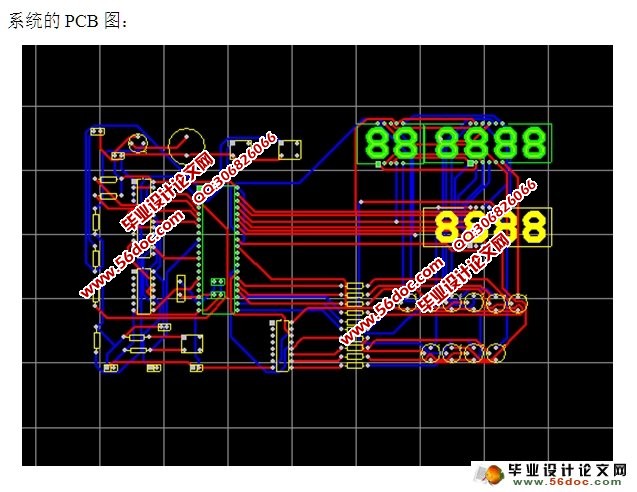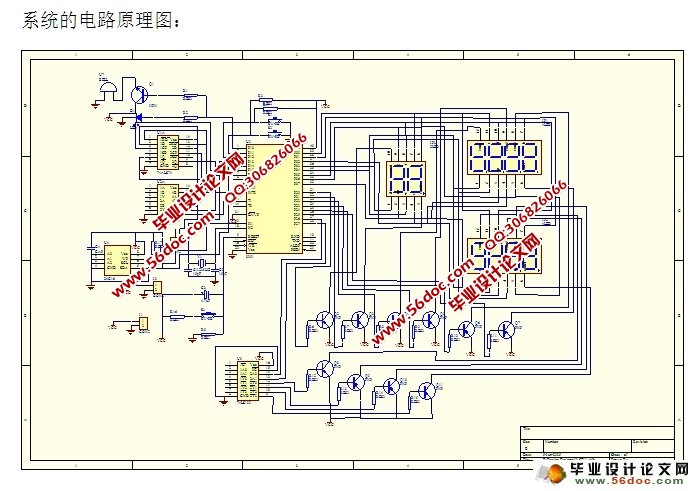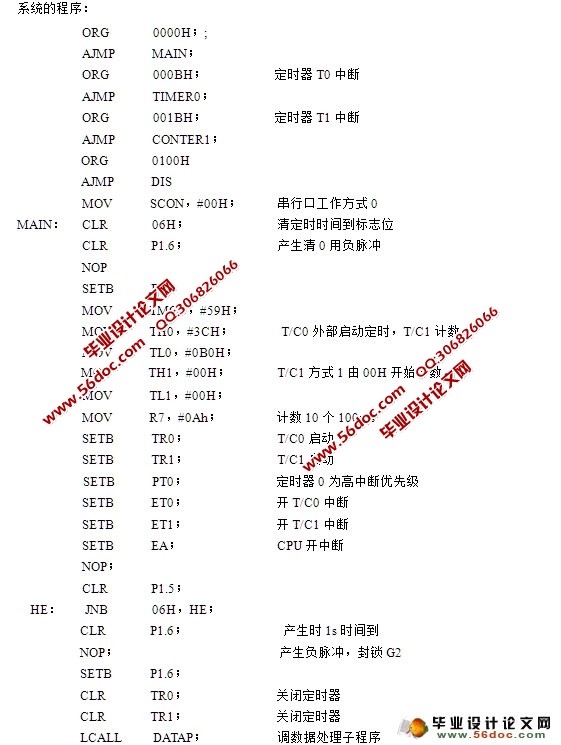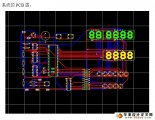电子式里程表的设计(AT89S51单片机)(附程序,原理图,PCB图)(任务书,开题报告,中期报告,外文翻译,论文26000字)
摘 要
里程表广泛应用于各类机车,传统的机械式里程表虽然稳定可靠,但功能单一、易受磨损。随着电子技术的迅猛发展,电子式里程表得以广泛应用,现在很多轿车仪表已经使用电子车速里程表,本设计介绍一种基于单片机的智能电子里程表。该电子式里程表是一种数字式仪表,主要由车速表和里程表两部分组成,其传感器采用无接触测量的光电传感器。它不仅可显示车辆行驶的总里程,也可显示一段时间的阶段里程,还可显示车速,以及实现超速报警等功能,并具有较强的再开发能力。它的实现方式是,通过安装在汽车转轴上的测量盘,用光电式转速传感器检测转速的脉冲信息,在脉冲状态下,将转速的变化转换成光通量的变化,再通过光电转换元件将光通量的变化转换成电量的变化,接着通过频率测量电路将脉冲信号输入到单片机中,然后依据电量与转速的函数关系实现转速测量,再通过计算,从而得出里程、车速的信息,并由LED显示器显示出来。并且该电子式里程表累积的里程数字存储在非易失性的EEPROM存储器内,在无电状态下数据也能保存。
关键词:AT89S51单片机;里程表;光电传感器;LED显示器;存储器
Abstract
Vehicle odometer is applied in each kind of motorcycle extensively, although the traditional machine type odometer stable and credible, but the function of it is single and be easily worn away. Along with the technical fast fiercely develop in electronics, the electronic vehicle can be applied extensively. Recently, a lot of car appearances have already used the electronic vehicle odometer, this graduation thesis introduce a kind of intelligence electronic vehicle odometer, which is based on a Single-Chip Microcomputer system. The electronics' type vehicle odometer is a kind of numerical type appearance, which mainly constitute with two parts, that is vehicle speed meter and odometer, it adopts the light sensor that the sensor has no contact measure. It not only can show the total mileage that vehicle drive, but also can show the stage mileage of a period of time. Moreover, It’s can show the car speed, and the realization exceed the speed limit to report and so on. It also has the ability of strongerly develop again. The way of this vehicle odometer carry out is as follows: through the installed measure plate in the automobile shaft, use the light sensor to measure the rotational speed information. Under the pulse appearance, it make the variety rotational speed change to the variety of the light flux, after that the variety of the light flux convert to electricity quantity. Then through the light electricity convert component, we can make the pulse signal input to the Single-Chip Microcomputer by the frequency measure circuit. Then in terms of the function relationship of electricity quantity and rotational speed, we can realize the measure of rotational speed, after calculate by the Single-Chip Microcompute, we can obtain the information of mileage and vehicle speed. Moreover, This mileage and vehicle speed information can be displayed by the LED monitor. And the mileage numeral of the electronics' vehicle odometer accumulation is saving in EEPROM,which is not easily lost, the data also can keep under the no electric appearance.
Keyword:AT89S51 Single-Chip Microcomputer;Odometer;Light sensor;LED ;Memory
该电子式里程表以AT89S51单片机为核心,由系统输入、单片机部分和系统输出组成。其主要模块有报警装置、键盘输入、光电传感器、显示、单片机以及EEPROM存储器。



目 录
引言 ………………………………………………………………………1
1 总体设计……………………………………………………………………2
2 系统设计可行性分析…………………………………………………2
2.1 总体设计分析……………………………………………………………………2
2.2 硬件模块…………………………………………………………………………3
2.3 软件模块…………………………………………………………………………6
3 硬件单元电路设计……………………………………………………………………7
3.1 传感器的设计……………………………………………………………………7
3.2 单片机与光电传感器的接口设计………………………………………………11
3.3 单片机与外部存储器的接口设计………………………………………………13
3.4 单片机与超速报警电路的接口设计……………………………………………13
3.5 单片机与键盘和7段显示器的接口设计……………………………………… 13
4 软件设计……………………………………………………………………14
4.1 脉冲测量部分……………………………………………………………………16
4.2 键盘输入部分……………………………………………………………………17
4.3 数据处理部分……………………………………………………………………18
4.4 存储器部分………………………………………………………………………21
4.5 超速报警部分……………………………………………………………………24
4.6 显示部分…………………………………………………………………………25
5 系统调试……………………………………………………………………27
5.1 硬件单元电路调试………………………………………………………………27
5.2 软件程序调试……………………………………………………………………29
5.3 整体调试…………………………………………………………………………32
6 系统使用说明……………………………………………………………………32
7 系统功能的扩展……………………………………………………………………33
8 结论…………………………………………………………………………………33
谢辞 …………………………………………………………………………………35
参考文献…………………………………………………………………………………36
附录…………………………………………………………………………………………37
|







